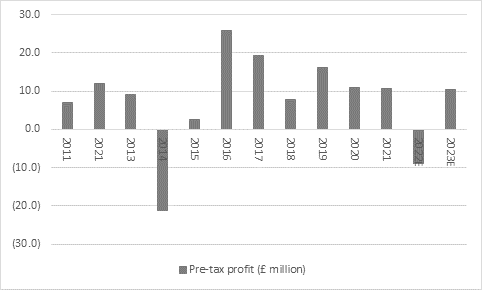“It is usually a bad sign when a company flags that profits will be more weighted toward the second-half than usual and it often implies that management has the prayer mat out and is hoping something helpful will turn up. In McBride’s case, something has turned up, but it is more trouble, in the form on more inflationary cost pressures, not more help,” says AJ Bell Investment Director Russ Mould. “The manufacturer of own-brand cleaning liquids, powders and aerosols now flagging a greater-than-expected first-half loss due to higher input costs, higher fuel costs and shortages of haulage capacity.
“McBride first warned on profits back in August, when it flagged that price increases would take time to come through and compensate for the margin-squeezing impact of rising costs.
“Management followed up in September by saying a £10 million cost-cutting programme would help mitigate margin pressure in the year to June 2022 but in October chief executive Chris Smith warned of a £10 million loss, on the basis of earnings before interest, taxes and amortisation (EBITA).
“At that point McBride noted it was pushing through a second round of ‘substantial’ price increases, in the mid-to-high teens percentage range. But the firm is now admitting even that is not proving to be enough, as costs are galloping ahead faster than the firm can get clients to pay higher prices. Although price rises will start to help from this month onwards, Mr Smith and his boardroom colleagues now expect McBride to lose between £14 million and £17 million on an EBITA basis in the six months to December 2021.
“Analysts had already been expecting a full-year loss on this basis of around £5 million but McBride’s second half really is going to have to go some to meet even those forecasts.

Source: Company accounts, Marketscreener, consensus analysts’ forecasts (prior to profit warning on 16 December). Financial year to June.
“There can be no clearer indication of the damage that inflation can do, and it is no wonder that central bankers are (finally) getting fidgety on the topic. Before the August warning, analysts had expected McBride to make £20 million in pre-tax profit. They were still looking for £12 million after that alert only for October to see analysts take their estimates into the red.
“Nor is the inflationary spiral by any means over, given that McBride’s second round of price increases will really start to take effect this month and next after a bit of a lag relative to input costs.
“McBride’s difficulty in putting up prices quickly enough to compensate for higher input costs are a reminder to investors that pricing power is a key attribute for any firm to have, even if markets are currently being remarkably tolerant of, and generous to, companies which do not make profits and almost seem to lose more money they more customers they grab.
“If inflation does take hold, promises of future profits after the current dash for market share and critical mass may well look less attractive. Investors may shy away from such profitless prosperity and instead focus on companies which can demonstrate their ability to protect margins and still generate profits and cash flow.
“McBride’s role as a contract manufacturer, or at least a maker of own-label cleaning agents for retailers, means it does not have any pricing power from brands, as it has no brands of its own. Many of its customers are larger and have more muscle when it comes to pricing discussions. And there are other suppliers who can be used as a bargaining chip by customers for good measure.
“McBride therefore looks like a classic study for Porter’s Five Forces, a framework that investors could do well to bear in mind if inflation really does take hold. The analysis, first outlined by Michael Porter in the Harvard Business Review in the 1970s, outlines the five threats to any company’s competitive position and thus its ability to charge the prices it wants, and not just the prices customers are prepared to pay.
“They are the
• fight for market share within a given industry
• the threat posed by new, disruptive market entrants
• the threat posed by product substitution
• the bargaining power of raw material suppliers
• the bargaining power of buyers
“For the moment, it looks like McBride is the meat in the sandwich between suppliers and buyers and its profits – and share price – are being squeezed accordingly.”
